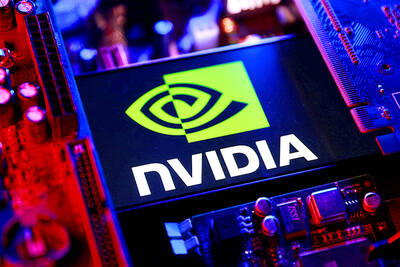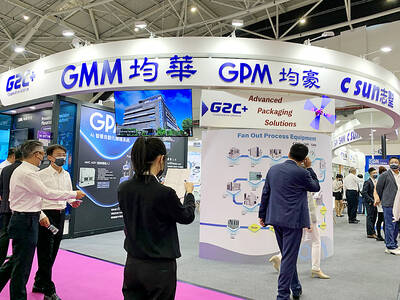Solar cell maker Gintech Energy Corp (
However, the company denied a report in the Chinese-language Economic Daily News that it had teamed up with BES Engineering Corp (
Citing unnamed company officials, the report said that under the alliance, Gintech would supply photovoltaic cell products, while Solaria would assemble the cells and BES construct the plant.
"Bidding for the solar power plant is one of the strategies under consideration," Gintech said in a filing to the Taiwan Stock Exchange yesterday.
"However, we have not formed an alliance with any contractor so far," the company said.
Demand for solar power plants is strong and Gintech, aided by sufficient supply from US silicon wafer producer MEMC Electronic Materials Inc, is a popular supplier for the plants, the report said.
The market for solar power is estimated to hit US$5.2 trillion after 2012, when costs of generating electricity through solar power will have dropped significantly from current levels, the report said, citing anonymous officials at Gintech.
Founded in August 2005 with light-emitting-diode manufacturer Everlight Electronics Co (
Gintech has an annual capacity of 60 megawatts and is expected to add another 480 megawatts after its plant at the Hsinchu Science Park is completed by the end of the year.
The company debuted on the Taiwan Stock Exchange last Friday and outpaced its peers to become the highest-priced solar cell stock in the local market.
Shares of Gintech slid 1.23 percent to close at NT$400 (US$12.35) yesterday, while those of its larger rival, Motech Industries Inc (茂迪), were unchanged at NT$335, and E-ton Solar Tech Co's (益通光能) edged down 1.62 percent to NT$364.

POWERING UP: PSUs for AI servers made up about 50% of Delta’s total server PSU revenue during the first three quarters of last year, the company said Power supply and electronic components maker Delta Electronics Inc (台達電) reported record-high revenue of NT$161.61 billion (US$5.11 billion) for last quarter and said it remains positive about this quarter. Last quarter’s figure was up 7.6 percent from the previous quarter and 41.51 percent higher than a year earlier, and largely in line with Yuanta Securities Investment Consulting Co’s (元大投顧) forecast of NT$160 billion. Delta’s annual revenue last year rose 31.76 percent year-on-year to NT$554.89 billion, also a record high for the company. Its strong performance reflected continued demand for high-performance power solutions and advanced liquid-cooling products used in artificial intelligence (AI) data centers,

SIZE MATTERS: TSMC started phasing out 8-inch wafer production last year, while Samsung is more aggressively retiring 8-inch capacity, TrendForce said Chipmakers are expected to raise prices of 8-inch wafers by up to 20 percent this year on concern over supply constraints as major contract chipmakers Taiwan Semiconductor Manufacturing Co (TSMC, 台積電) and Samsung Electronics Co gradually retire less advanced wafer capacity, TrendForce Corp (集邦科技) said yesterday. It is the first significant across-the-board price hike since a global semiconductor correction in 2023, the Taipei-based market researcher said in a report. Global 8-inch wafer capacity slid 0.3 percent year-on-year last year, although 8-inch wafer prices still hovered at relatively stable levels throughout the year, TrendForce said. The downward trend is expected to continue this year,

‘BASICALLY A BAN’: Sources said the wording governing H200 imports from officials was severe, but added that the regulations might change if the situation evolves Chinese customs authorities told customs agents this week that Nvidia Corp’s H200 artificial intelligence (AI) chips are not permitted to enter China, three people briefed on the matter said. Chinese government officials also summoned domestic technology companies to meetings on Tuesday, at which they were explicitly instructed not to purchase the chips unless necessary, two of the people and a third source said. “The wording from the officials is so severe that it is basically a ban for now, though this might change in the future should things evolve,” one of the people said. The H200, Nvidia’s second-most powerful AI chip, is one

STRONG SALES: The company said that revenue growth momentum would remain strong this year and next year as major customers continue to buy new equipment Semiconductor equipment supplier Gallant Precision Machining Co (均豪) yesterday reported its best annual profit in 19 years last year, as booming artificial intelligence (AI) chip demand boosted sales of its advanced packaging equipment. Net profit surged about 40 percent to NT$415 million (US$13.12 million), compared with NT$297 million in 2024, the company said in a regulatory filing. Earnings per share rose to NT$2.58 from NT$1.82. Revenue grew 5.18 percent annually to NT$4.67 billion from NT$4.44 billion in 2024. Gallant Precision said revenue growth momentum would remain strong this year and next year as major customers continue to spend heavily on new equipment to boost